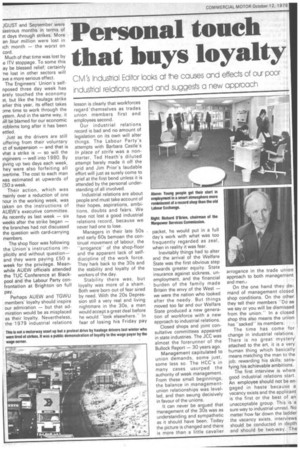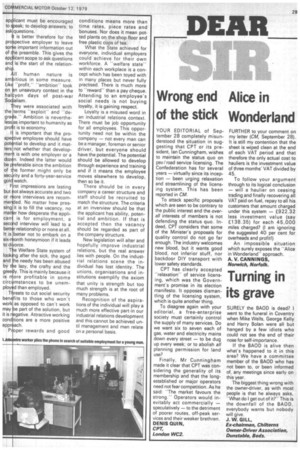Personal touch that buys loyalty
Page 30

Page 31

If you've noticed an error in this article please click here to report it so we can fix it.
CM's Industrial Editor looks at the causes and effects of our poor industrial relations record and suggests a new approach
JGUST and September were Sastrous months in terms of 3t days through strikes. More an four million were lost in ich month — the worst on cord.
Much of that time was lost by ITV stoppage. To some this ay be blessed relief; certainly me lost in other sectors will we a more serious effect.
The Engineers' Union's selfnposed three day week has arely touched the economy at, but like the haulage strike 3rlier this year, its effect takes Dme time to work through the ystem. And in the same way, it /ill be blamed for our economic roblems long after it has been ettled.
Just as the drivers are still uffering from their voluntary ct of suspension — and that is vhat a strike is — so will the ingineers — well into 1980. By Jiving up two days each week, hey were also forfeiting all wertime. The cost to each man as estimated at upwards of ;250 a week.
Their action, which was mainly over a reduction of one nour in the working week, was taken on the instructions of AUEW's executive committee. As recently as last week — six weeks after the strike began — the branches had not discussed the question with card-carrying members.
The shop floor was following the Union's instructions implicitly and without question— and they were paying £50 a week for the privilege. Meanwhile AUEW officials attended the TUC Conference at Blackpool and the Labour Party confrontation at Brighton on full pay.
Perhaps AUEW and TGWU members' loyalty should inspire our admiration — but that admiration would be as misplaced as their loyalty. Nevertheless, the 1979 industrial relations lesson is clearly that workforces regard 'themselves as trades union members first and employees second.
Our industrial relations record is bad arid no amount of legislation on its own will alter things. The Labour Party's attempts with Barbara Castle's 1r7 place of strife was a nonstarter, Ted Heath's diluted attempt barely made it off the grid and Jim Prior's laudable effort will just as surely come to grief at the first bend unless it is attended by the personal understanding of all involved.
Industrial relations are about people and must take account of their hopes, aspirations, ambitions, doubts and fears. We have not lost a good industrial relations record, because we never had one to lose.
Managers in their late 50s and early 60s bemoan the continual movement of labour, the -arroganceof the shop-floor and the apparent lack of selfdiscipline of the work force. They hark back to the 30s and the stability and loyalty of the workers of the day.
Stability there was, but loyalty was more of a sham. Both were born out of fear sired by need. With the 20s Depression still a very real and living nightmare in the 30s, a man would accept a great deal before he would "look elsewhere.In fear of losing his Friday pay
packet, he would put in a full day's work with what was too frequently regarded as zeal, when in reality it was fear.
Inevitably things had to alter and the arrival of the Welfare State was the first obvious step towards greater equity. State insurance against sickness, unemployment, and the financial burden of the family made Britain the envy of the West — we were the nation who looked after the needy. But things moved too far and our Welfare State produced a new generation of workforce with a new approach to industrial relations.
Closed shops and joint consultative committees appeared in state industries. The JCC was almost the forerunner of the Bullock Report — 30 years ago.
Management capitulated to union demands, some just, some less so. The HCC's in many cases usurped the authority of weak management. From these small beginnings, the balance in managementunion relationships was levelled, and then swung decisively in favour of the unions.
It can never be argued that Management of the 30s was as understanding and sympathetic as it should have been. Today the picture is changed and there is more than a little cavalier arrogance in the trade union approach to both management and men.
On the one hand they demand of management closed shop conditions. On the other they tell their members "Do as we say or you will be dismissed from the union.In a closed shop this also means the union has "sackedits members.
The time has come for change in industrial relations. There is no great mystery attached to the art, it is a very human thing which basically means matching the man to the job; rewarding his skills; satisfying his achievable ambitions.
The first interview is where good industrial relations start. An employee should not be engaged in haste because a vacancy exists and the applicant is the first or the best of an unacceptable group. This is a sure way to industrial unrest. No matter how far down the ladder the vacancy exists, interviews should be conducted in depth and should be two-way. The ap licant must be encouraged to eak; to develop answers; to ask questions.
is better therefore for the pro pective employer to leave so e important information out of t e preamble. This gives the ap leant scope to ask questions an is the start of the relationshi ll human nature is am itious in some measure. Lik "profit," "ambition" took on n unsavoury context in the hal yon days of post-war So alism.
hey were associated with the terms "exploit" and "degra e." Ambition is nevertheless as important to humanity as pro t is to economy.
I is important that the prospe tive employee should have pot ntial to develop and it matters not whether that developme is with one employer or a doz n. Indeed the latter would be • eferable since the ambition of t e former might only be sec rity and a forty-year-service gol watch.
F rst impressions are lasting but ot always accurate and two or ore interviews are recomme ed. No matter how pressing it is to fill the vacancy, no ma r how desperate the applican is for employment, a sec d interview will lead to a bett r relationship or none at all, It is better not to .embark on a sixonth honeymoon if it leads to di orce.
T e Welfare State system of look g after the sick, the aged and he needy has been abused by t e lazy, the crafty and the gree y. This is mainly because it is ore profitable in some circ mstances to be unemploy d than employed.
T reats to cut social security ben fits to those who won't wo as opposed to can't work may e part of the solution, but it is gative. Attractive working cond tions are a more positive appr ach.
P per rewards and good conditions means more than time rates, piece rates and bonuses. Nor does it mean potted plants on the shop floor and free plastic cups of tea.
What the State achieved for everyone, individual employers could achieve for their own workforce. A "'welfare state" within each workplace is a concept which has been toyed with in many places but never fully practised. There is much more to "reward" than a pay cheque. Attending to an employee's social needs is not buying loyalty, it is gaining respect.
Loyalty is a misused word in an industrial relations context. There must be job opportunity for all employees. This opportunity need not be within the company — not every man can be a manager, foreman or senior driver, but everyone should have the potential. The potential should be allowed to develop through experience and training and if it means the employee moves elsewhere to develop, then so be it.
There should be in every company a career structure and staff should be recruited to match the structure. The criteria at an inverview should be that the applicant has ability, potential and ambition. If that is accepted then the vacancy should be regarded as part of the company structure.
New legislation will alter and hopefully improve industrial relations, but the real answer lies with people. On the industrial relations scene the individual has lost identity. The unions, organisations and institutions exemplify the axiom that unity is strength but too much strength is at the root of many problems.
Recognition of the aspirations of the individual will play a much more effective part in our industrial relations development and this cannot be achieved until management and men relate on a personal basis.
























































































































